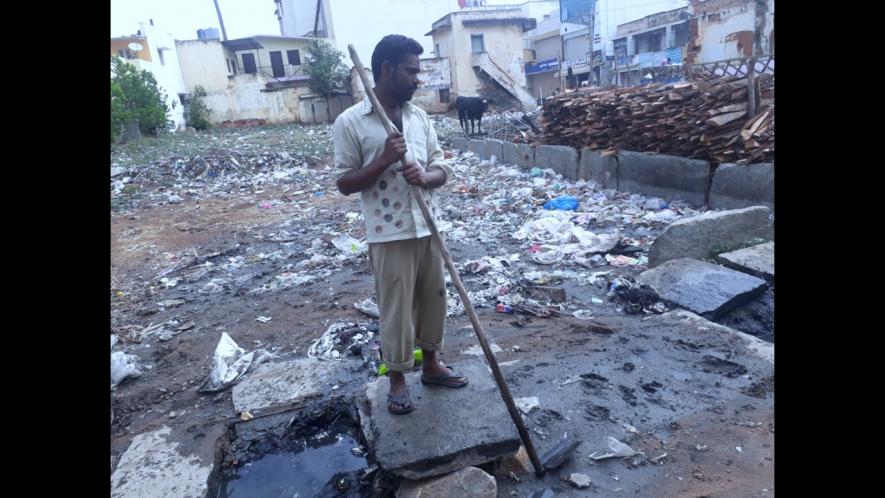New Manual Scavenging Bill Stresses on Technology, Ignores Caste

Representational image.
One of 23 Bills to be tabled in Parliament during the ongoing 18-day Monsoon Session is the Prohibition of Employment as Manual Scavengers and Their Rehabilitation (Amendment) Bill, 2020. This is set to amend the law enacted in 2013, which provides for a fine of up to Rs 5 lakh or imprisonment of up to five years or both for engaging any person for hazardous cleaning of sewers and septic tanks.
The text of the new Bill is not yet in the public domain.
The Ministry of Social Justice and Empowerment had published a document in March this year, with the title ‘National Action for Mechanised Sanitation Ecosystem’. It explains that despite the Prohibition of Employment as Manual Scavengers and their Rehabilitation Act of 2013, people continue to be engaged in hazardous cleaning of sewers and septic tanks. The document mentions that 882 deaths had taken place since 1993 where people engaged in cleaning septic tanks and sewers lost their lives.
In view of this, critics of the proposed amendments say the stress is on “modernisation” and “technology”, without a concern for caste or the social status of those traditionally associated with sanitation work. Moreover, the document released by the government in March seeks to make provision for a class of “sewer entry professionals” selected “from traditionally employed sanitation workers”. “It is not necessary to employ all the SEPs on permanent government rolls,” the document explicitly states.
However, experts say sanitation work has to be done on a permanent basis, and regular appointment will not only go some way towards easing the unemployment crisis, but also offer a measure of dignity to those engaged in it. Communities will gain from having a scientifically trained cadre of people engaged in the daily management of garbage. Sanitation workers across the country are fighting for regularisation for a long time. It was only after a 36-day struggle in 2016 that workers in Ahmedabad got the corporation to grant them regular jobs.
Nearly all sanitation work in India is done by workers from dalit castes. A 2019 report prepared by NGO PRIA (Participatory Research in Asia) found: “The nearly six million households of Dalit sub-castes are known by different names across the country – to name a few Valmiki, Bhangi, Mehtar, Chooda in northern and western India; Bassfor, Dom, Ghaasi in eastern India; Thoti, Arundhatiyar, Madiga in southern India. Between 40 to 60% of these six million households are engaged in sanitation work.” They are either employed as regular employees of municipal corporations, or in contractual arrangement, or working as outsourced labourers. “The perennial association of sanitation work with a particular caste has caused an entire community’s lived experiences to entail emotional trauma of social isolation, invisible citizenry and economic depression,” the report says.
The March 2020 document from the government noted that while sewer systems exist mostly in urban areas, septic tanks are used in individual households in rural parts; cleaning of these tanks is an unregulated activity and manual cleaning of such tanks without taking the necessary precautions or using safety gear is the cause of many deaths. Mechanisation of such work does not exist in India, as in many developed countries. Since the existing law has not eliminated manual and hazardous cleaning operations, more stringent measures are needed, the document explains.
The document seeks modernisation, prevention of human entry into sewer systems and rehabilitation of those already engaged in such work. The plan is to set up fecal sludge and management systems to enable mechanised cleaning. Local government bodies are to be equipped with the appropriate technology and machinery. Provision is also to be made for “training and certification” of sanitation professionals, either “in-house or through reputed institutions.” Private agencies engaged in cleaning work are to be compulsorily licenced, and only those who can ensure “total mechanised cleaning” should be given licences, said the document.
The document states that there are “15 innovations developed across the country to replace manual cleaning”. An annexure to the March document mentions, for instance, a machine called ‘bandicoot’ developed by a Thiruvananthapuram-based start-up, Genrobotics, a spider-shaped robot “that cleans manholes with precision”. It also mentions a device designed by two retired engineers of the Hindustan Aeronautics Limited in Bengaluru, called “sewer croc”. This machine can detect poisonous gas build-up in sewers and offer warnings. The device is water-jet powered, and can reportedly clean even narrow sewers.
A helpline functional round-the-clock is proposed, to attend to complaints about sewers and arrange for cleaning and removal of blockage; a “sanitation response unit” will be set up in each district. The modernisation of sewer systems is proposed to be completed by 2023.
Proposed funding for the project is also outlined in this document – one septic haulage vehicle, which can serve six households per day under three-year septic tank emptying cycle would cost Rs 28 lakh, the document notes. There are also figures provided for providing wastewater treatment (Rs30,960 crore), but the basis for arriving at this sum is not provided in the document. Wastewater collection and treatment is estimated at over Rs1 lakh crore. The basis of these calculations is also unclear.
Siddharth KJ of the Safaikaramchari KavuluSamiti-Karnataka (Committee for the care of sanitation workers) said, “Manual scavenging is rampant, yet not a single person has been convicted under the 2013 Act. That just shows how our caste-based society has accepted the daily indignity suffered by workers who come from the most marginalised castes. In Karnataka, insanitary latrines were built for a religious festival in 2018, in violation of the PEMSR Act 2013 and Dalits were brought from Uttar Pradesh to clean these toilets. Permission to do all this was granted by none other than the deputy commissioner, who is supposed to be responsible for the implementation of the 2013 Act!”
While social scientists and activists agree that the 2013 Act needs amendment, given how hazardous cleaning of sewers has continued, they point out that the bill has been introduced without prior consultation. It also lacked any analysis of the reasons for the failure of the 2013 Act.
In a letter to Members of Parliament, academics and activists, including public health professional Sylvia Karpagam and educationist Anil Sadgopal, write: “In the legislative agenda, the purport of the amendment Bill is listed as ‘complete mechanization of sewer cleaning and to provide better protection in work, the compensation in case of accidents’. The absence of any reference to the lives and demands of the workers suggests that even the proposed Bill may be narrowly focused on technological solutions.” It further added, “Any process of reform in the law should necessarily begin with the workers engaged in this occupation (3) and the proposed changes should be available in all Indian languages to enable full democratic participation from all citizens. Public consultation processes would have offered a necessary corrective to these and other lacunae in the amendment Bill.”
(Rosamma Thomas is a freelance journalist based in Pune)
Get the latest reports & analysis with people's perspective on Protests, movements & deep analytical videos, discussions of the current affairs in your Telegram app. Subscribe to NewsClick's Telegram channel & get Real-Time updates on stories, as they get published on our website.
























